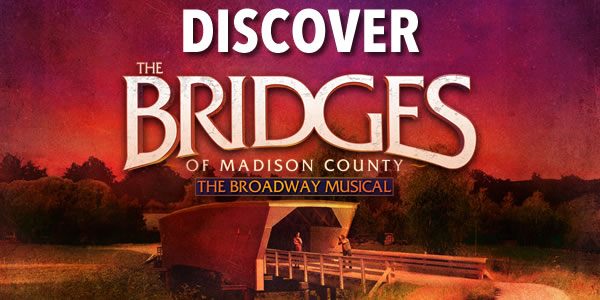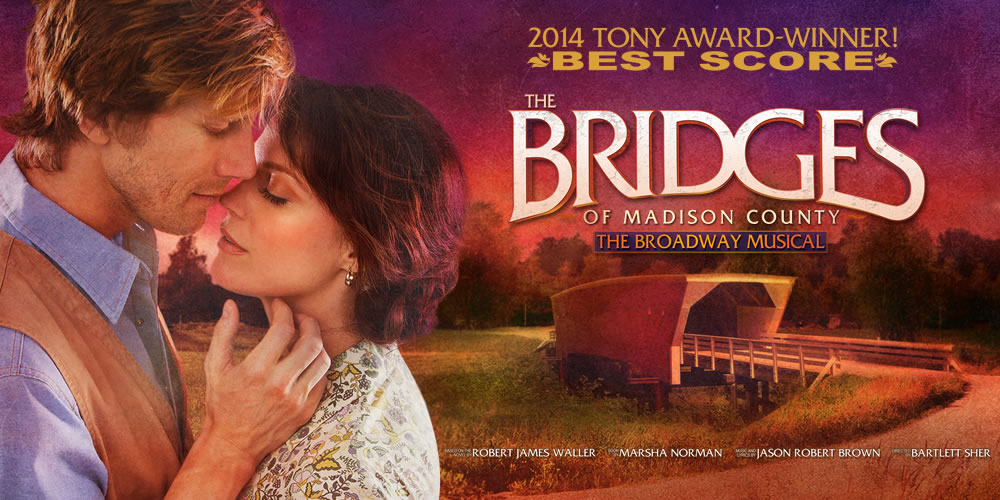Discover The Bridges of Madison County: MARSHA NORMAN
Posted on February 3rd, 2016

CONVERSATION WITH PULITZER PRIZE-WINNING WRITER MARSHA NORMAN by Journalist/Teaching Artist Marcos Nájera
Marcos: Thank you for taking the time to talk with us Marsha. We want to give people a chance to learn a little about this story and you —a member of the creative team — before they experience The Bridges of Madison County.
Marsha: Sounds good. This isn’t simply the story of Francesca and Robert. This is the big difference [between our musical] and the book and the movie. This is the story of the town. This is the story of the family. And the story of this couple in the course of a family, in the course of a town. It’s more like Our Town than the original material is. We really zoomed back so we can see the family life and the town life and we can learn Francesca’s history in Italy.
We zoomed back and we panned around. I invented the neighbors. We invented the town. We invented the people who would really care about Francesca and who would be aware, in this small town, that she was going through something.
That is wonderful. You mentioned Our Town by playwright Thornton Wilder. How did Our Town inspire your take on The Bridges of Madison County?
I love Our Town. I don’t even know how many times I’ve seen it. I think it’s one of the great, inspiring pieces of American literature. It’s clear in the cemetery scene of Our Town how much they’ve all taken care of and watched out for each other.
I also know that in a small town — as Our Town makes clear —
a small town, like where Francesca and Robert are, everybody knows what’s going on. So everybody knows that the kids and Bud are headed off for the State Fair. And everybody knows that Francesca is there by herself. And everybody knows that there is a photographer, in town taking pictures. And everybody knows that she took him over to the bridge. Everybody knows everything. What I really wanted to do was to make it clear that Francesca makes her decision in the context of her family and her town and her history.
Jason [Robert Brown, the composer] and I were eager to hop from Iowa all the way back to Italy — to show what the end of the war was really like in Naples and what she experienced as a girl. And why she is here [in the United States] and what kind of things she’s never really come to terms with as a human being. Because she’s spent her time adjusting so quickly.
She came here, she was newly married, she didn’t speak much English. She learned English, she learned to farm, and she learned to be a wife, to be a mom, and presto! Somebody shows up at
the door and she realizes she does feel like an outsider. And now, she does need to think about how she has spent her life and she does need to feel alive again as she did as a girl. What Robert does is cause her to take a deep breath in and look around; to connect with herself and to connect to him, but mainly herself.
It’s this moment that people have when they think, “What about that other path? What about that love that I had to turn away from? What about that? What would have happened if I married that guy who went to the University of New Mexico?
What would have happened?
We can’t help but wonder those things, right? The people that I see crying the hardest in the audience are the people that have obviously left great loves behind. That’s something a lot of people respond to — including a lot people on the creative team. Everybody, I think! (Laughing)
So yes, we have these questions. We all deal with this thing. We can’t have absolutely everything that we want to have in life. Because some of these things conflict.
Robert’s description of [what his and Francesca’s] life would be is so seductive and wondrous. Whether she would actually be happy with him or not, it doesn’t even matter. She makes the decision to honor her responsibilities and she knows that if she leaves, her son is going to be in trouble. [Her daughter] Carolyn is going to be fine. But [her son] Michael? She still needs to stay to take care of Michael. To make sure Michael does okay. That’s why we see Michael’s graduation from medical school. She did have that effect. Michael was ready to bolt out of there and get in trouble with the law and his dad or whatever — and she saw that. She knew that he wasn’t going to be a farmer. She knows she has to stay.
We sometimes have to make those really hard choices between the things that we care about.
I wonder about the danger of the town watching all this happen. It seems like the stakes rise so much higher if everybody can see that she is talking to this stranger while Bud and the kids are away. Isn’t Francesca scared?
She is scared. The fact that we don’t do any of that —[Francesca] having a dangerous conversation with [the neighbor] Marge or Marge almost finds out [about the affair] — that seemed a little cheap to us in terms of the excess drama.
But yes, it’s on her mind. Especially when she goes into town to buy
a dress. Certainly, she knows that Marge knows. And there’s a whole conversation — unwritten and unspoken — that goes on between Marge and Francesca about what’s going on. That’s why Marge arrives at exactly at the right moment with the lasagna. Marge knows exactly what’s happened.
It’s almost as if Francesca’s all-knowing neighbor, Marge, is cheering her on!
She is. She certainly is not judging. The friendship with Marge is deep and powerful. For me, the most wondrous moment in the whole show is right there at the end when [Marge] leaves from Bud’s funeral and says, “See you tomorrow!” It’s like, “Things continue here and I’m going to see you tomorrow [Francesca]. You feel such a loss right now. You’ve lost both of these men now and here you sit. And I will see you in the morning.” (Laughing)
That’s the kind of thing, the comfort that women can provide to each other. I was very interested in writing that in the piece. It is Francesca’s story. But it is [also] a story of what women can do for each other.
That’s why I mentioned Our Town. Two generations ago, Thornton Wilder wrote about Grover’s Corner. Now, Jason and I are writing about Winterset, Iowa. It’s a continuing interest and dream that we all have of belonging to a place and belonging to a group of people and belonging in the family.
To me, one of the awful parts of the virtual world is that, okay, we have a virtual family. But is that really okay? Is that good? Is that enough? Or do you want to know enough people so that if you make a pie, like that one I made last night that’s that good, you can call other houses and get the whole pie eaten? This pie last night was so remarkable that I thought, “I do not need to let it sit around here in the house where just my daughter and I are. I need to call three people to have some!”
The pie should be enjoyed! Life should be enjoyed right? It makes me think about the scene in the Bridges movie where Meryl Streep is in the truck. And the camera focuses in as the muscles in her right hand tighten as she grips the handle and she’s about to open the door and go off to Robert. Do you think we live in a world now that is progressive enough for her husband Bud to just let her go?
“People come
to musicals
to watch that
glorious search
for home…”
—Marsha Norman
The piece brings up all this “what would happen,” that’s fun to suppose about. But for Francesca she’s got to make that decision in-that-moment. The truck moment [from the film] is so crucial that we worked really hard to find something that would give us a sense of the truck moment. That’s what we call “The Rewind.”
That’s where she appears to go to Robert. Suddenly, she turns around and stops and sees her family and knows what they would feel if she did that. And she walks back to them. And then time picks up again and she goes on into the Soda Shop.
In that moment that she chooses her family — it’s Robert’s world that falls apart. That’s our theatrical way to investigate the “what- would-happen-if-I-did-this?”What I was able to do was give voice, give character, give personality, give wishes to every single person in this family. I think [Francesca] does the right thing. I totally think she does the right thing. But man, do I understand the struggle. That sense of being alive put up against the sense of being connected in a family or being responsible. This passion of feeling alive is pretty powerful, but the sense of being useful and being loved beats it every time.
The book really tells the story from Robert’s point of view. Why did you decide to focus on Francesca’s point of view for this musical?
The Francescas of the world are the 70% of the people buying the tickets to the theater. So women should have a story where they’re the lead. I have a picture that’s on my wall. It was taken at Samuel French. Kelli O’Hara [who played Francesca on Broadway] is standing there with no make-up and she’s holding a piece of paper on which is written “I need stories by women on stage because my daughter will hear the echo of their voices.” It’s an extraordinary picture.
I’m the President of the Lily Awards, which is an organization that celebrates and honors the contributions of women in the theater and works for gender parity. Kelli received an award from us the year before last. I mean, she’s certainly played all the glorious [female leads on Broadway], but for [Bridges] to be the first time she has ever said words on stage that were written by a woman?
I was hearing this for the first time as she was saying this on the stage [at the Lily Awards]. And it was a staggering experience for me and I think for the audience. I suddenly felt the significance of my staying alive in order to write. And my activism and the importance of this mission of gender parity, so the voices of women can be heard and the stories of women can be told.
In regard to gender parity, if life worked the way the theater does, 4 out of every 5 things
you heard would be said by men. In working for gender parity we are working to hear all
the voices of the human chorus on the stage. All the voices. All the stories. In not hearing the voices of women, it’s almost as if theaters have chosen to only tell stories about things that happen in the daytime. It’s eliminating half of the experience of life on the stage.
We need to hear all the voices in the human chorus.
So yes, if an all-male team had written this —I’m sure it would have been the Robert story. I’m totally sure. And what is the Robert story? I came into town, I met this woman. We had a thing, I had a couple of thoughts of whether or not to haul her off in the truck with me and then I left. Got back to New York and saw the Hare Krishnas.So there’s not a musical in the Robert story. There’s only a musical in the Francesca story.
As in Oklahoma, so it is in Iowa. The loners have to go on their way. It’s true with musicals in general. I teach musical book-writing [at Juilliard]. This is one of the big rules. The loners go on their way. But people come to musicals to watch that glorious search for home in song. It’s like The Wizard of Oz, where does Dorothy end up? It’s the Francesca story, it’s the Tevye story, it is every musical there is.
[The playwright Jerome] “Jerry” Lawrence told me this: “All musicals are about the conflict between two worlds.” It’s Guys & Dolls, it’s West Side Story, it’s Oliver… you can go on down the list, The King & I. Two worlds. In this case, it’s the life of passion versus the life of family and community.
If you think about us as a country — there are things that we’ve lost. And yes, we mourn them. We had to give them up in order to go forward towards the other things we believe. This making of choices is something that people respond to and in this case they get to really watch a big one, a big choice and it’s kind of the most elemental one.
It’s a story about choice.

THE BRIDGES OF MADISON COUNTY is presented by Dallas Summer Musicals February 2-14, 2016 at Music Hall Fair Park. Tickets are ON SALE NOW!
–Click here for tickets
–Click here for details/sneak peek



